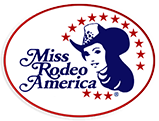
A rodeo ambassador should be dedicated to promoting the sport of rodeo and enhancing it in any way possible. Media interviews are a vital part of that job, and a great way to share the sport of rodeo with those who maybe haven’t been exposed to rodeo. It’s important to smile, have fun, and be professional. Additionally, here is some advice to help you confidently excel at media interviews:
- Be prepared to answer questions about the event/rodeo you are attending and promoting. Example: how many years has this rodeo taken place, where is it held, where can tickets be purchased and for how much, who is the specialty act and announcer, who are some of the contestants (especially any local talent), who is the stock contractor and what are some of the best match-ups, etc. Know everything you can about the event/rodeo you are attending. This will help you promote the event/rodeo when doing media interviews, as well as, visiting with people in the community.
- Be familiar with the media source you are talking to. Example: if you are taking to a radio DJ and they ask you to request your favorite song, you’ll need to know what kind of music they play. You should always keep a record of who you talk to. An easy way to do that is to simply ask for a business card. You can then follow up so you can share the interview on your social media which also helps promote the rodeo.

- Always give a positive answer to every question. Be honest, but realize that if it is not live TV they will usually edit the interview to fit their time constraints. Often they will show your answer or part of your answer and not the question that was asked. For example: if I’m asked, “Is rodeo cruel to animals?” and I respond with, “No, rodeo is not cruel to animals…” that doesn’t sound near as positive for the sport of rodeo as saying, “I would love for everyone to see how rodeo stock and the equine partners are cared for in professional rodeo. Not only does the Professional Rodeo Cowboys Association have over 60 rules and regulations to ensure the well-being of rodeo livestock, but those involved in rodeo understand how valuable the livestock is to their livelihood. Their equine partners are like family, and I can tell you that my horses have been to the spa in the last month more than I have in my entire life.” That answer also gives the interviewer an easy follow up question such as, “horses have spas?!”

- Let your personality show and try to personalize your answers (this does not mean talking about yourself the whole time) to give the interview a conversational feel.
- Handle all questions intelligently, and use correct grammar.
- Only take the microphone is it is offered to you.
- If the interviewer is with you in the camera shot (instead of standing near the camera and only showing you in the shot), you will need to stand close together. It feels too close for comfort, but don’t fade away from the interviewer during the interview even though that’s a natural inclination. It’s best to ask where they prefer you to look, but typically if you’re together in the camera shot, look at the interviewer and occasionally glance at the camera. If you’re in the camera shot alone, they’ll usually want you to look at the interviewer and not the camera. If they’re having you do a promo, they’ll most likely want you to look directly at the camera.
- Always follow the instructions you are given. You can ask if there is a time limit so you can adjust the length and details of your answers accordingly.
- Listen to each question and answer it the best you can, but also have a couple of points you can talk about in case there is an open-ended question and there’s plenty of time to use.
- Be early to media interviews. They’ll most likely be adjusting lights, getting you in focus, etc. and it would be helpful to have you there and ready ahead of time.
- While doing media interviews – as well as speeches and impromptu questions – remember to breathe, and have a relaxed and pleasant tone. Your excitement for the event will transfer to your audience, and it is obvious if you believe what you are saying and are passionate about it.

I’ve had the opportunity to interview lots of amazing people, but the ones I remember most are those who showed personality and were captivating, genuine, and honest while still being professional. Being comfortable in front of a camera doesn’t come natural for everyone, so practice until you’re confident. I’ll end with this encouraging quote from Sherry Cervi, “Work hard, keep your standards high, and never settle for anything less than what you are capable of achieving.”
«
How to Work With Designers Giving Back as Miss Rodeo America Pageant Alumni »





